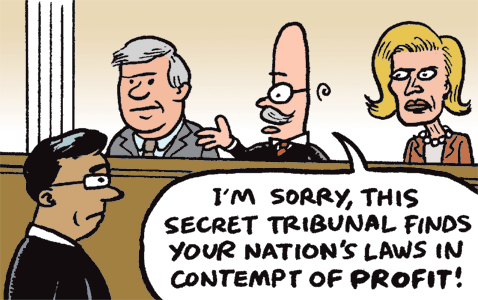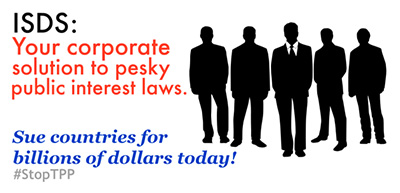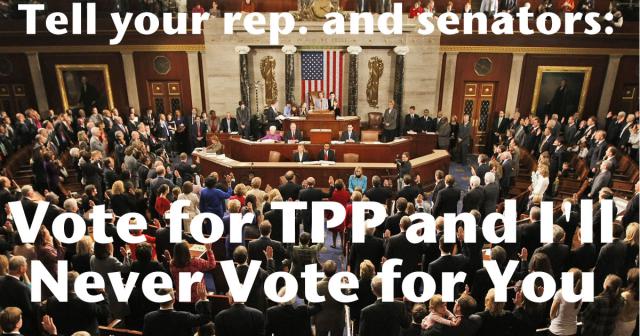Authored by Stephen Paley with site publication date of August 25, 2016
For those unaware of the ISDS provision in TPP what I'm about to relate may smack of Alice in Wonderland, but unfortunately it is true. The Alice and Wonderland novel tells of a girl named Alice falling through a rabbit hole into a fantasy world populated by peculiar, anthropomorphic creatures.
First, the terms of any treaty take precedence over a nation's laws. Also, the ISDS provision appears not only in TPP but in prior trade treaties as well. But, as will be explained, its use specifically in TPP would transition our nation from democratic decision making to the rule of multinationals!
 The ISDS provision in TPP allows multinational corporations to sue our government at any level, local state or national not in a US court, but before a Tribunal of three corporate attorneys picked by multinational corporations. These attorneys serve as temporary "judges" and then most go back to working, directly or indirectly, for multinational corporations. Suits can be brought only by multinationals and only for "loss-of-profit", either current or projected future profits. Nations that lose a suit have no right of appeal. And even Presidential Executive Orders have been subject to such suits under NAFTA.
The ISDS provision in TPP allows multinational corporations to sue our government at any level, local state or national not in a US court, but before a Tribunal of three corporate attorneys picked by multinational corporations. These attorneys serve as temporary "judges" and then most go back to working, directly or indirectly, for multinational corporations. Suits can be brought only by multinationals and only for "loss-of-profit", either current or projected future profits. Nations that lose a suit have no right of appeal. And even Presidential Executive Orders have been subject to such suits under NAFTA.
There are only a limited number of ways for any corporation to lose profit. And the ISDS Tribunal, over the span of several different trade treaties, has created a series of "legal precedents" that presently cover all but one of these ways. And recently the Tribunal came very close to covering the last remaining way as well. Had they done so, it would now be "illegal" under TPP for any US law or policy to cause a multinational (even inadvertently) to lose profit in all of the ways that are possible for a corporation to lose profit. (Whatever it is, "guaranteed profit" is not capitalism.)
 When a nation loses a suit to a multinational corporation the Tribunal has the power to demand that the "offending" law or policy be rescinded. The Tribunal has backed this demand (in NAFTA) by imposing one-time fines in the hundreds-of-millions-of-dollars. These fines which come out of our national treasury even for "offending" laws or policies at the local or state level can also be ongoing until the offending law is or policy is rescinded.
When a nation loses a suit to a multinational corporation the Tribunal has the power to demand that the "offending" law or policy be rescinded. The Tribunal has backed this demand (in NAFTA) by imposing one-time fines in the hundreds-of-millions-of-dollars. These fines which come out of our national treasury even for "offending" laws or policies at the local or state level can also be ongoing until the offending law is or policy is rescinded.
So here is why ISDS in TPP is so much more dangerous to our Democracy than it was in prior trade treaties. First, not every multinational corporation is entitled to use the ISDS provision. Bur the list of those multinationals that are allowed to use it has been hugely expanded in TPP compared to prior trade treaties. This would enable many more transnational corporations to sue to strike down our laws and policies. Secondly, the list of "legal precedents" available in TPP, that cover the various ways for a multinational to lose profit, is just one way shy of all the possible ways. This also enables many more suits to be brought by multinationals to invalidate our laws and policies.
Finally, let’s examine some specific laws that would be invalidated by ISDS in TPP. One simple way to lose profit is for a corporation's expenses to rise. So, if an environmental law, or a minimum wage law or name your own favorite law caused even one multinational corporation’s expenses to rise, it would have to be rescinded if that multinational brought suit before the TPP Tribunal.
 The single way that a corporation could lose profit that, so far, wasn't upheld by the Tribunal is a multinational losing profit by its market being reduced in size. This suit was brought under NAFTA by Phillip Morris against Uruguay for a law that prevented smoking among that nation's youngest children, And this would have decreased the size of the tobacco market in Uruguay thereby reducing Phillip Morris' projected future profit in that nation. The fine threatened by the Tribunal was almost the size of Uruguay's GDP but the suit, although it came close to being won by Phillip Morris, was in the end dismissed possibly because of the large amount of International publicity that the matter had generated. (Note that not even a contract between Phillip Morris and Uruguay was required for this suit to be accepted for litigation by the Tribunal.)
The single way that a corporation could lose profit that, so far, wasn't upheld by the Tribunal is a multinational losing profit by its market being reduced in size. This suit was brought under NAFTA by Phillip Morris against Uruguay for a law that prevented smoking among that nation's youngest children, And this would have decreased the size of the tobacco market in Uruguay thereby reducing Phillip Morris' projected future profit in that nation. The fine threatened by the Tribunal was almost the size of Uruguay's GDP but the suit, although it came close to being won by Phillip Morris, was in the end dismissed possibly because of the large amount of International publicity that the matter had generated. (Note that not even a contract between Phillip Morris and Uruguay was required for this suit to be accepted for litigation by the Tribunal.)
Had this last precedent been established it could or would, among other things, have prohibited member nations of TPP from passing laws or adopting policies that encouraged replacement of fossil fuels by wind and solar. The effect would have been to significantly increase the time over which fossil fuels remained in the marketplace and possible to even enable their use to be expanded. Yet most scientists claim that mankind's survival may depend upon the rapid faze-out of fossil fuels.
Allowing multinational corporations to veto our laws and policies based on whether they lose profit will wreak havoc on our democracy, our economy, and our rights as citizens. Yet President Obama has just announced that he will try to pass TPP before the end of the year, most likely during the Lame Duck session of Congress when legislators who have lost their elections, or are retiring, can still vote but are no longer accountable to their constituents. In my opinion, at the very least, the President must renegotiate TPP to remove its ISDS provision or else drop the entire treaty completely.
Source: Stephen Paley

